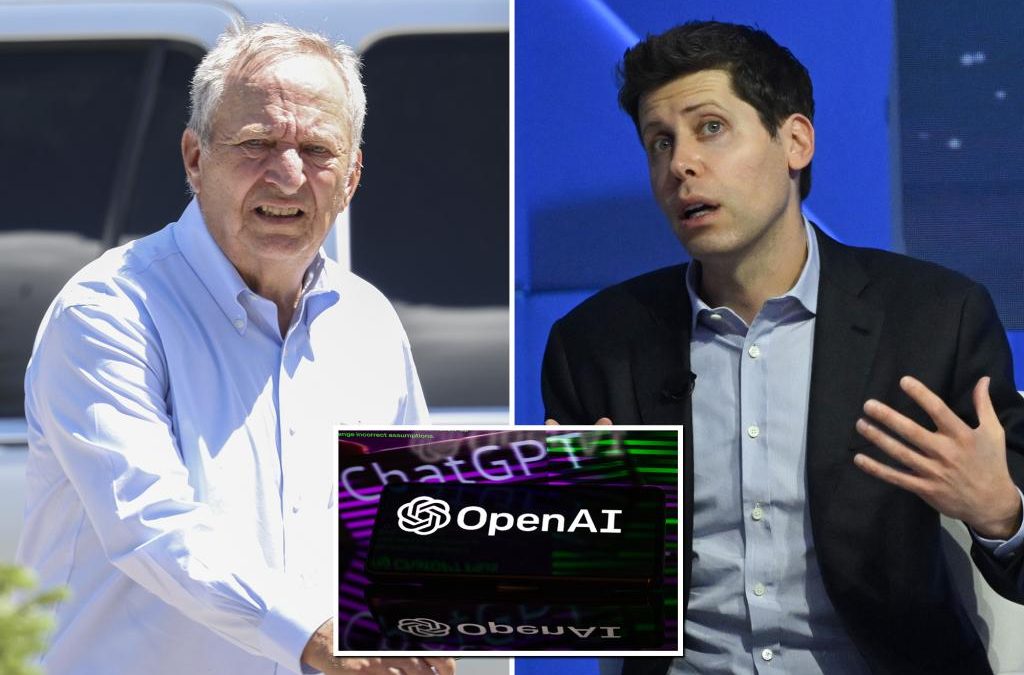OpenAI said former Treasury Secretary Larry Summers will reportedly join a new, enlarged board of directors at the embattled artificial intelligence firm, even as it reinstated Sam Altman as chief executive five days after firing him.
In the latest surprise development at the company behind ChatGPT, Summers will likely be tasked with recruiting fellow board members and sorting out its governance — a major bone of contention for its biggest financial backer, Microsoft, which currently has no representatives on the board.
At the moment, OpenAI said it has an “initial board” that, aside from Summers, includes chairman Bret Taylor, the former co-CEO of Salesforce, and existing board member Adam D’Angelo, the CEO of Quora.
“We are collaborating to figure out the details. Thank you so much for your patience through this,” OpenAI shared in an X post announcing Altman’s return and its new board.
A source who asked to remain anonymous when discussing private negotiations told Bloomberg that Altman and an executive at Microsoft also could be tapped as directors.
OpenAI’s previous board members included D’Angelo and OpenAI co-founder and chief scientist Ilya Sutskever, who has expressed regret at participating in Altman’s surprise ouster. The other two directors were Tasha McCauley of GeoSim Systems and Helen Toner, director at Georgetown’s Center for Security and Emerging Technology.
It wasn’t immediately clear if Greg Brockman — a close ally of Altman’s who said he would step down from the board, but later quit his role as OpenAI’s president entirely in protest of Altman’s ouster — would return as a board member.
Representatives for OpenAI did not immediately respond to The Post’s request for comment.
As an OpenAI board member, Summers will get a closer look at the company behind ChatGPT, which he said in an April interview was “coming for the cognitive class” and would render higher-skilled roles obsolete first, according to Bloomberg.
“ChatGPT is going to replace what doctors do, hearing symptoms and making diagnoses, before it changes what nurses do,” Summers — who led the Treasury Department in the Clinton administration and worked as an economic adviser in the Obama administration — told Bloomberg at the time.
“It’s going to change what traders do going in and out of financial markets before it changes what salespeople do.”
It’s not the 68-year-old economist’s first venture into Silicon Valley. Summers also sits on the board of Twitter founder Jack Dorsey’s Block Inc. He joined in 2011 when the payment processing company was known as Square.
Summers — also a former Harvard president — has also held directorships at a “hyperdata” app called Premise, financial services company LendingClub, and software company Skillsoft Corp.
OpenAI has seemingly been on Summers’ radar years before it launched, debatably triggering the AI boom.
“The robots are coming,” Summers penned in a Washington Post column in 2017.
A year later, he disputed claims from then-Treasury Secretary Steve Mnuchin that AI would not replace American jobs for 50 to 100 years.
And in December 2022 — a month after ChatGPT disrupted the tech landscape — Summers compared the chatbot to the printing press and electricity. “This could be the most important general-purpose technology since the wheel or fire,” he told Bloomberg.
Altman’s reinstatement potentially marks the end of a chaotic interlude at OpenAI, which has been in turmoil since Friday, when the ChatGPT maker’s prior directors suddenly fired Altman, vaguely calling the AI whiz “not consistently candid in his communications with the board.”
In a whirlwind of a weekend, Altman then accepted a position at Microsoft, prompting upheaval at OpenAI as more than 700 of the startup’s 770 staff signed a letter threatening to quit if the board didn’t reinstate Altman.
The leading AI firm did not elaborate on Altman’s missteps that led to his resignation at the time.
By markets’ open on Monday, the San Francisco-based company had named former Twitch CEO Emmett Shear the interim chief of OpenAI.
Shear, who had only been at the helm of the company for 72 hours, said he was “deeply pleased” by OpenAI’s decision to reinstate Altman.
“Coming into OpenAI, I wasn’t sure what the right path would be. This was the pathway that maximized safety alongside doing right by all stakeholders involved. I’m glad to have been a part of the solution,” he added in a Wednesday morning tweet.
Source




